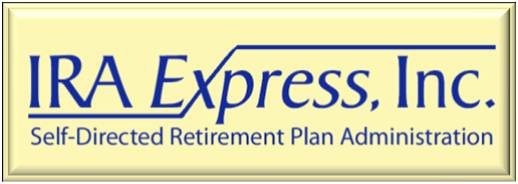Investment Options
Real Estate
Real Estate IRA Quick Hints
Real Estate IRA Basics
With a self-directed IRA, one of the assets that you are allowed to invest in is real estate. As long as you follow the IRS rules regarding prohibited transactions and disqualified persons, you can purchase any type real estate asset that you could purchase outside of your IRA such as vacant land, rental homes, apartment buildings, or commercial properties.
The process of a typical real estate transaction is quite simple. Once you go through the process the first time we are confident you will see how easy the process really is.

Step 1: Open and fund your account with IRA Express. Find a property that you are interested in and make an offer in the name of your IRA. The buyer will be listed on final closing documents as: IRA Express, Inc. as agent for Custodian for the benefit of [Your Name], [IRA Number].
Step2: If your offer is accepted, send IRA Express a Buy Direction Letter for Real Estate that provides all of the details regarding the purchase of the property. Be sure to include information about where to send the earnest money deposit, since this must be paid from your IRA funds.
Step 3: IRA Express will communicate directly with the title company that is handling the transaction to coordinate the closing of the property.
Step 4: Prior to the closing deadline the title company sends final closing documents to IRA Express to be executed. IRA Express will execute the closing documents after obtaining your final “read & approved” signature.
Step 5: IRA Express sends the necessary documents to the title company and wires the money from your IRA for the closing.
Step 6: After the title company records the deed for the purchase of the property your IRA becomes the legal owner!
Get Started Today!
Open An Account
Purchase a Real Estate Asset
Avoiding Prohibited Transactions in a Real Estate IRA
When buying real estate in your IRA it is important to understand that the real estate asset is owned by your IRA; therefore; all income collected from the property must be sent to your IRA. Likewise, all expenses for the property such as: property taxes, HOA fees, or special service dues, must be paid from your IRA. Income that is sent to IRA Express should be made payable to your IRA and should be accompanied by a Deposit Coupon form. To request a payment from your IRA funds for an expense a Payment Authorization Letter is required.
Because your IRA is meant for your retirement, you or any other disqualified person cannot use the assets owned in your IRA. This means that your parents (and parent-in-laws), you and your spouse, your children, and grand children cannot use the real estate for any reason.

Things to remember:
- DO NOT personally collect and deposit income from your IRA owned assets.
- DO NOT personally pay expenses relating to your IRA owned assets. Doing so could disqualify the tax status of your IRA!
- DO NOT personally perform manual “fix-it” labor for property repairs and maintenance.
- DO NOT live or dwell on the property for any reason.
- DO keep an arms-length position in regard to the property.
- DO make sure cash in-flow and out-flow goes in and out of your IRA account with IRA Express.
- DO make sure all repairs and maintenance done on the property are completed and invoiced by an unrelated non-disqualified party.
- DO rent or lease the property to an unrelated non-disqualified party.
Learn More About Prohibited Transactions
Managing your IRA Owned Property
Although using a property manager for your IRA owned property is not required, using one can prove to be very beneficial. A property manager makes it very easy to maintain a hands-off approach when it comes to managing your IRA owned real estate. The property manager finds tenants for your property, collects rents, and pays expenses. After the rents have been collected and after all the expenses have been paid, the property manager sends the net rental proceeds to IRA Express to be deposited into your IRA.
Hiring a property manager could prove to be a smart move in the management of your IRA owned real estate.

Structuring Real Estate IRA Investments
What if your IRA account is not large enough to purchase 100 percent of a property, or what if a unique ownership structure is necessary?
- Partnering – An IRA can own a portion of a property and partner with any number of people, other IRAs, or even yourself. You can also partner with your spouse’s retirement plan. The key to partnering is that all income and expenses are split proportionately according to the percentages listed on the deed. So if your IRA owns 25 percent it is responsible for 25 percent of the expenses and receives 25 percent of any income generated.
- LLC Ownership – A different form of partnering on a real estate purchase could occur by establishing an LLC with your partners. Each partner would own a percentage interest in the LLC which would in turn own the real estate. The manager of the LLC would make sure that all income and expenses for the property are collected in and sent out of the LLC operating account. The LLC must be established by competent legal counsel, and it must ensure that all IRS tax rules regarding prohibited transactions and disqualified parties are followed. If the LLC distributes earnings to its shareholders, they must be distributed according to the percentage of ownership as it is out lined in the LLC operating agreement. When operating an LLC that has an IRA(s) as a member it is a very good idea to maintain a close relationship with your tax and legal counsel. Keep in mind that most prohibited transactions occur when IRA assets are held through LLC ownership.
- Non-Recourse Loans – Your IRA can also borrow money through a non-recourse loan, which is similar to a commercial loan. With a non-recourse loan, you and your assets are not involved. The loan is strictly to your IRA and is often based on the estimated positive cash flow of the property. The only asset used as collateral for the loan is the real estate being leveraged. Most banks that provide non-recourse loans require at least a 35 percent down payment, and they generally require above average interest rates. The IRA is responsible for the mortgage payments. You can also obtain funding of a non-recourse loan through a private lender. However, be aware that if your IRA has borrowed money to purchase an asset, the debt financing is subject to unrelated business income tax.

Learn More About Unrelated Business Income Tax
Selling IRA Owned Real Estate
When you decide to sell your IRA owned real estate the process is very easy and is similar to when it was purchased.
Step 1: Come to terms with a buyer for the property and have all parties execute a real estate purchase contract (REPC).
Step 2: After the purchase contract is finalized, send IRA Express a Sell Direction Letter for Real Estate that provides all of the details regarding the sale of the property. Be sure to include information about who the buyer is, and what title company will be assisting with the transaction.
Step 3: IRA Express will communicate directly with the title company that is handling the transaction to coordinate the closing for the sale of the property.
Step 4: Prior to the closing deadline the title company sends final closing documents to IRA Express to be executed. IRA Express will execute the closing documents after obtaining your final “read & approved” signature.
Step 5: IRA Express sends the necessary documents to the title company, ownership of the property is recorded in the name of the buyer, and the proceeds from the sale of the property are delivered to your account with IRA Express.
Step 6: You can begin looking for your next investment!

How Do I Get Started?
Getting started is easy. . .
Step 1: Fill out a new account packet and send the appropriate documentation and forms to IRA Express. We usually have your account open within 1 – 2 business days.
Step 2: Fund your account by performing a Contribution, Direct Rollover from a 401(k), or an IRA Transfer from another IRA account. This usually takes about 2 weeks.
Step 3: Once your account is funded you can begin looking for your investment.

Contact IRA Express Today!

